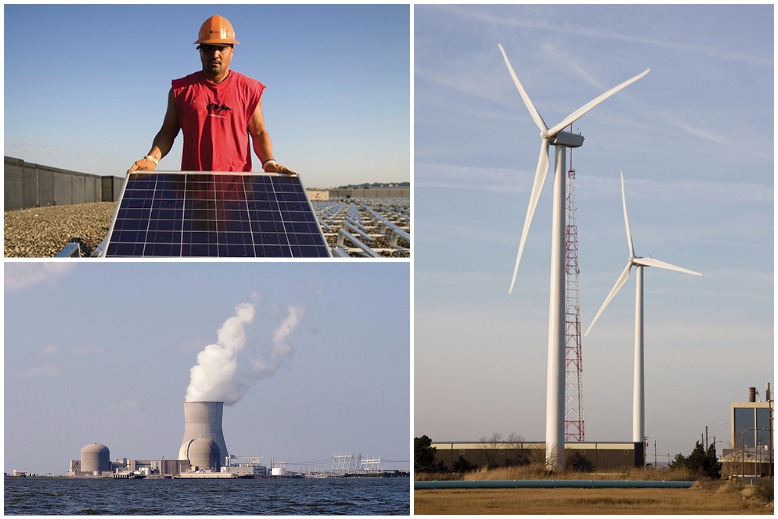
Clockwise from left: Worker installing solar panels on the roof of a store in Westhampton (Robert Nickelsberg/Getty Images); wind turbines at the Jersey-Atlantic Wind Farm in Atlantic City (John Van Decker/Alamy Stock Photo); and the Salem Nuclear Power Plant (Jim Kidd/Alamy Stock Photo).
While there’s no one solution for the problem of global warming, the head of the state’s largest energy utility says there’s plenty to be done on the local, state and federal levels, as well as in your own home. Among the goals: Reduce America’s carbon footprint and encourage renewable energy.
“Our carbon footprint is far too big,” says Ralph Izzo, president and CEO of PSEG, parent company of PSE&G. “There’s increased scientific evidence that we need to cut back on that.”
Izzo says the state is moving in the right direction. “We’re doing a good job of investing in clean technologies like preserving existing nuclear, investing in new solar, and investing in new offshore wind.” However, he adds, “when you look at the costs associated with those new technologies…you can achieve the same carbon reductions for far less expense by investing in energy efficiency. That’s not to say we shouldn’t do the solar and wind. It just means that we haven’t done enough of the energy efficiency.”
During a recent visit to Think Tank With Steve Adubato, my program that airs on PBS stations NJTV, Thirteen/WNET and other outlets, Izzo shared his ideas for dealing with global warming.
For consumers, he says, energy efficiency can simply mean changing light bulbs from incandescent to LED. Also, consumers should program their thermostats to different temperatures at night versus the daytime to achieve energy and cost savings.
At the same time, businesses, utilities and all levels of government need to do their part. For example, he says, utilities should be made responsible for putting in programmable thermostats and efficient heating systems, just as they are responsible for building and maintaining the power lines and the pipelines that deliver the supply.
[RELATED: State Plants Seeds for First Offshore Wind Farms]
To that end, PSEG is considering a proposal to invest $3.6 billion over the next six years to bring universal access to energy efficiency to their customers. That would cut consumption and lower energy bills.
Unfortunately, Izzo says, our national energy policy is sorely lacking. “The smartest way to reduce carbon is to set a single price for carbon—and there are various mechanisms for doing that. One is called cap-and-trade. It was very successfully deployed in [combating] acid rain. Another is carbon tax.” With a carbon tax, says Izzo, you can “let the market decide what the best technology is to reduce carbon.”
Also, says Izzo, states can contribute to the effort by pooling resources. “There’s a little bit more wind in the Adirondacks and Appalachians than there is in New Jersey. There is a little bit more sun in Arizona than there is in New Jersey,” says Izzo. “If you had a national system—and clearly what you really need is an international system—you have a far more efficient way of dealing with climate change.”
Some see a renewed commitment in nuclear energy as part of the big picture, but Izzo notes that, after decades of nuclear generation, we still have not solved how to safely dispose of spent fuel. If not handled properly, spent fuel can be a significant environmental hazard.
Izzo adds that even solar and wind can present environmental challenges. In the case of wind, for example, if turbines are improperly located, they can be inefficient, use up too much land, or interfere with bird travel. Then again, “if you put it in the right place,” says Izzo, “it’s a wonderful resource.”
Bottom line: All of us need to work together to ensure a brighter future for our children and our children’s children.
